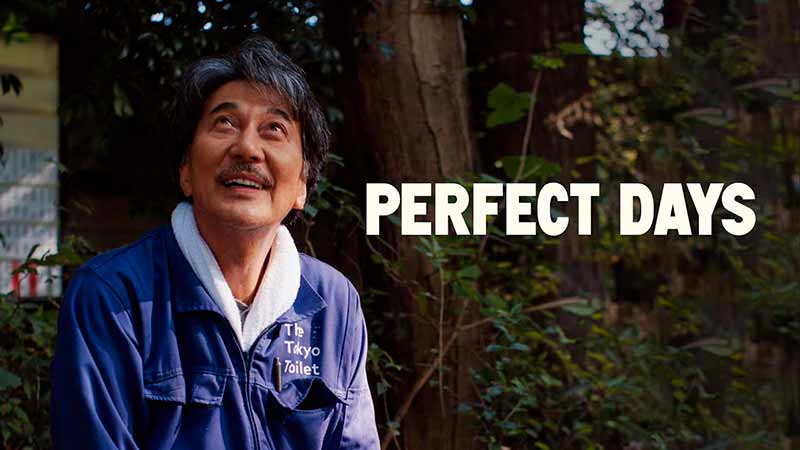The extraordinary in everyday life
“Perfect Days” by Wenders

The German filmmaker, Wim Wenders, invites us to reflect with his film Perfect Days on the good life, happiness, and the meaning of human existence, based on the significance acquired by the simple daily routines of a solitary and silent cleaning employee of public toilets in Tokyo. Wenders, in a humanist commitment of the first order, makes the film praise life as the greatest asset we possess, highlights the value of time, and denies both consumerist society and the frenetic pace of the modern world that reduces existence to mere survival, something temporary that prevents us from seeing the extraordinary of each day.
The camera of the German director, Wim Wenders, turns the spectators from the first minute of footage into the silent companions of the daily routines of Hirayama, the main character of Perfect Days, masterfully played by the Japanese actor Kôji Yakusho. From the moment he wakes up in his tiny, barely furnished apartment, we see how he picks up the mat on which he sleeps, washes himself, waters his plants with care and delicacy, dresses in the jumpsuit from the “Tokyo Bathrooms” cleaning company, He gets into his van with a coffee machine and chooses a cassette tape to listen to music. We follow Hirayama through the different futuristic toilets, built in the Tokyo Olympics, which he cleans conscientiously and with the skill of a craftsman, happy to do a job that serves the community. On his break, he takes a sandwich, looks up smiling – perhaps seeking divine complicity – and with his analog camera he portrays the treetops and the sky. When his day is over, we change the van for a bicycle, and we go with him to the bar he frequents every day, where they serve him a soft drink to celebrate a job well done. Afterward, we follow him to the laundromat, to the photo store, to develop the film and pick up the previous prints, to buy a used book when he has finished the previous one, to take a hot bath in public facilities, to have dinner at a small restaurant of familiar treatment and, finally, back home where, by the light of a small lamp, he reads until his dreams overcome him, always in black and white.
As the film progresses, Hirayama’s routine becomes a mirror of our daily lives, but with some obvious differences that make it inevitable that we begin to envy a simple life, in harmony with nature, slow and quiet, with time to stop and look what many do not even perceive, like the beautiful play of shadows of sunlight filtering through the leaves of the trees. Precisely, shadows have important symbolism in the film related to happiness and dreams. Wenders manages to surprise us with the humanity and sensitivity that the protagonist’s routines exude, capable of living the present moment as a unique moment that happens only once, exorcising boredom. The filmmaker inevitably guides us to compare Hirayama’s conscious life with our frenetic pace, the alienation in which we live, technological dependence, the existential fatigue caused by the culture of immediacy, permanent dissatisfaction, addiction to novelty and a consumerist society that encourages unlimited performance and exploitation to also buy compulsively.
The director who wrote the film in collaboration with the Japanese screenwriter and director Takuma Takasaki captures us with his meditation on the importance of life as the greatest asset we have and the value of the time we waste in front of computer screens or watching absurd videos on the mobile. There is no need to dedicate any image to portray this reality, it is enough for us to see that Hirayama’s world is not that of the Tokyo telecommunications tower, which symbolizes a similar “progress” that also abducts the West. Wim Wenders remains faithful to his style of giving little information to let the viewers imagine, get involved in the lives of the characters and want to know more about his story. So the lyrics of the songs that, day after day, the protagonist selects when he gets into his van, put words to the silences. Music thus becomes another protagonist of the film. In fact, Wenders takes the title of the film from the Lou Reed song “Perfect Days,” which invites us to learn to be happy and celebrate the simple things in life that make us feel good. The three books that Hirayama reads also shed light on the central character, whose personality is revealed to us through his actions.
Three key meetings
All in all, there are three encounters, with brief moving dialogues, which introduce important script twists. The first, when, suddenly, a teenage niece who has run away from home appears, whom he takes in and with whom he stars in a memorable scene,
finished off with a phrase that summarizes the entire film. After both sharing a day on a bicycle, touring the river bank, the young woman suggests that her uncle continue to the mouth of the sea. And he tells him: “Next time (…) This time is this time and the next time will be the next time.” There is another moment in which intelligent humor contrasts the virtual and the reality, to which the character played by Koji Yakusho clings. His niece wants to find out if the van’s cassette tapes can be played on the iPhone and listened to on Spotify, and he asks where that store is.
This appearance is followed by a brief meeting with her sister, when she arrives with a luxury car and driver at Hirayama’s modest house in a humble neighborhood. “Do you live here?” and “Is it true that you clean toilets?” are the two questions that help to imagine that the main character must have had a different life in the past, probably more well-off and with a better-paid job. The protagonist’s sister informs her that his father, whom she has not visited for years, suffers from dementia and “is no longer the same as before.” Another fact that brings us closer to Hirayama’s past and to be aware that this character’s life also involves suffering is that, in this encounter, we see the protagonist cry for the first time when saying goodbye to his sister with a heartfelt hug. This refers us to the difficulty of making decisions about one’s own life that others may not share.
The third appearance, towards the end of the film, is that of the ex-husband of the cook and owner of the bar where our protagonist goes to have dinner every week, forging a close friendship with the woman. He is dying of cancer and confesses to Hirayama that he abandoned her to marry another of hers and, now, that he is going to die, he has felt the need to ask her forgiveness. The request that he take care of her leaves the door open to the possibility of a relationship.
The final three minutes are cathartic. Hirayama stars in a sustained close-up, riding in his van, with “Feeling Good” by Nina Simone in the background. This song refers to hope, new beginnings and feeling good about nature, freedom and life. In total harmony with Wim Wenders’ proposal, the lyrics remind us that, despite the struggles and suffering, there is joy and hope in the world because we can start again and create a better life. The German filmmaker is in the wake of directors like the Finnish director, Aki Kaurismäki, who roll up their sleeves and immerse themselves in current problems, but from a hopeful perspective.
In short, Perfect Days is a masterclass in good cinema and good living that will represent Japan at the next Oscars. This is a novelty because it is a country that usually chooses films by Japanese directors and, on this occasion, has chosen the film by Wim Wenders. Probably, due to the affection towards the Japanese actor, Kôji Yakusho, who carries the weight of the film, and because Wenders pays tribute to the cinema of Yasujiro Ozu, with a style that left an eternal mark on world cinematography for the ways of seeing life. and to delve into the depths of the human being.
Wenders’ film, a true work of art, has an unquestionable bioethical and philosophical interest in proposing that we embrace our human nature, instead of living as if we were machines and letting ourselves be carried away by the siren song in favor of progress as a beast balm. The frenetic pace and technological dependence plunge us into a drowsiness that makes it difficult for us to look inside ourselves to ask ourselves about what we want our lives to be like and prevents us from opening our eyes to the world around us to inhabit it differently. Hirayama is an example of a life that contributes to making the world better, and Wenders of filmmakers with a film style that leaves doors open to salvation.
Amparo Aygües – former student of the Master’s Degree in Bioethics – Collaborator of the Bioethics Observatory
Related

Francis’s Legacy: The Church, a Field Hospital
Isabel Durán Doussinague
23 April, 2025
2 min

The Challenges of the Next Pope and the Path of Grace
Javier Ferrer García
23 April, 2025
4 min

Easter for a Life of Hope
Mario J. Paredes
21 April, 2025
4 min

Munilla: ‘Chronic Adolescence’ or ‘Maturity in Christ’
Exaudi Staff
21 April, 2025
3 min
 (EN)
(EN)
 (ES)
(ES)
 (IT)
(IT)

